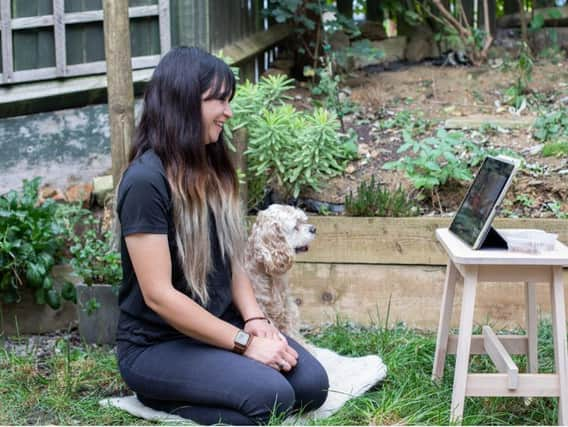Banbury-based charity - Dogs for Good - using technology in new ways to continue vital work during Covid-19 pandemic


Dogs being trained by UK assistance dog charity Dogs for Good have started attending training sessions on Zoom video calls.
When face-to face puppy training classes were no longer possible due to Covid-19 the trainers had to find new ways to support clients and volunteers. They’ve found video calls have been such a success that they have continued with them as lockdown eases.
Advertisement
Hide AdAdvertisement
Hide AdDogs for Good creates life-changing differences for people living with a wide range of disabilities and conditions including autism, physical disabilities, dementia and learning disabilities, through the help of a specially trained dog. The charity’s assistance and community dogs enable people to live more independently.
Every assistance dog is specially trained to help with practical tasks that many people with disabilities find difficult or impossible to do. This might include opening and closing doors, helping with dressing and undressing, retrieving items such as mobile telephones or dropped articles like keys or a bag, loading and emptying the washing machine, pressing a pedestrian crossing button and reaching up to shop-counters with items such as a wallet.
When the country went into lockdown in March, Dogs for Good had more than 101 puppies – future assistance dogs and community dogs – in the care of a fantastic band of volunteer puppy socialisers. Their task is to nurture and care for the puppies from eight weeks until they are ready to start their special assistance dog training at around 14-16 months of age.
Puppy co-ordinator, Abbey Chung, who lives in Banbury, looks after the training of approximately 30 puppies and their socialisers in Oxfordshire and the surrounding areas.
Advertisement
Hide AdAdvertisement
Hide AdIn the early days of lockdown, she had to adapt fast and one of the first things she learned, with tuition from Dogs for Good, was to shoot and edit training videos of herself with her dogs to share with socialisers on video calls.
Abbey also uses Zoom to demonstrate training methods with her own dogs; two beautiful American Cocker Spaniels named Chloe and Buffy to her puppy socialisers, and the socialisers can show her how their puppy is getting on with training on the video calls.
Abbey said: “When lockdown was first announced my initial reaction was one of panic. I was really worried I wouldn’t be able to support our volunteers and I knew we’d need to find new ways of working with them ASAP.
“At the beginning I had phone calls with socialisers but this was very limited and I wasn’t able to demonstrate training methods or see how their dog was behaving.
Advertisement
Hide AdAdvertisement
Hide Ad“I thought I’d try video calls instead because they’re much more interactive, and this worked much better. We usually use Zoom because it’s been the easiest and most accessible platform for most people.
“I don’t think there’s any way I would have done puppy classes on Zoom before lockdown happened! None of us could have imagined the situation we were in but it’s definitely helped us to think about using technology to support our volunteers in new ways.”
There were still a lot of practical problems to overcome. When Abbey first tried live training sessions on Zoom calls it was difficult to see which direction her camera was pointing, and socialisers found it hard to control their puppy at the same time as being on a call.
Abbey added: “It was pretty funny at times and we had a good laugh about it. Sometimes I’d see just the ceiling or they’d move out of position because they were working with the dog.
Advertisement
Hide AdAdvertisement
Hide Ad“Puppies don’t really understand the concept of video calls so they would often move out of shot from the camera or just be sleeping.
“People found it really difficult to get themselves and their puppy both on the screen at the same time.”
Abbey came up with the idea of pre-recording training videos and then watching them with the volunteers on Zoom calls. Socialisers also tell Abbey what they’ve been working on with their puppy, raise any areas of concern and let her see their puppy’s behaviour on camera.
Volunteers find the training videos extremely useful, especially if they have hearing difficulties, because they can re-watch them to refresh their memory, and turn up the volume. It has also meant that Dogs for Good has created a library of videos to share with future socialisers.
Advertisement
Hide AdAdvertisement
Hide AdAbbey said: “The training videos are a fantastic new resource at our disposal that we probably wouldn’t have had without lockdown.
“A few socialisers with hearing difficulties tell me they no longer need to feel embarrassed about interrupting me during a training session to ask me to repeat something, they know they can just watch that part again.
“Lockdown’s led us to make many changes in the way we work for the better and we’ll definitely continue to use many of these new methods in the future. It’s been great to be able to find so many new ways to support our volunteers.”
Funding from the Coronavirus Community Support Fund, distributed by The National Lottery Community Fund, has helped Dogs for Good to continue to support clients and volunteers during the crisis by funding new technology for staff.